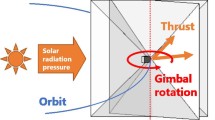Abstract
This paper proposes a new reconfigurable control strategy for the attitude control of a Low Earth Orbit (LEO) micro-satellite equipped with reaction control wheels and reaction control thrusters (used as a secondary actuation system). Control laws are combined with control allocation algorithms that enable the optimal allocation of control effort in case of reaction wheels saturation and/or faults as well as when control limits are reached (e.g. maximum torques provided by reaction wheels). This allows to effectively use the redundancy of the actuators set and guarantee robust stability and control of the satellite attitude. The effectiveness of the proposed strategy has been assessed through a numerical analysis that includes several simulation scenarios, where different initial conditions have been set and also the fault of a reaction wheel has been simulated. Simulations have shown the ability of the control architecture to effectively manage several control issues (i.e. maximum achievable torques, reaction wheel saturation and faults) through the allocation of control effort among all the available control effectors.






























Similar content being viewed by others
Data Availability
Not applicable.
Code Availability
Custom code.
Abbreviations
- AHRS:
-
Attitude and heading reference system
- CA:
-
Control allocation
- DoF:
-
Degrees of freedom
- ECI:
-
Earth-centered inertial
- GPS:
-
Global positioning system
- IMU:
-
Inertial measurement unit
- ISS:
-
International space station
- LEO:
-
Low earth orbit
- LQR:
-
Linear quadratic regulator
- RCTs:
-
Reaction control thrusters
- RWs:
-
Reaction wheels
- wrt:
-
With respect to
References
Xie, Y.C., Huang, H., Hu, Y., et al.: Applications of advanced control methods in spacecrafts: progress, challenges, and future prospects. Front. Inf. Technol. Electron. Eng. 17, 841–861 (2016). https://doi.org/10.1631/FITEE.1601063
Yin, S., Xiao, B., Ding, S.X., Zhou, D.: A review on recent development of spacecraft attitude fault tolerant control system. IEEE Trans. Ind. Electron. 63(5), 3311–3320 (2016). https://doi.org/10.1109/TIE.2016.2530789
Yang, Y.: Analytic LQR design for spacecraft control system based on quaternion model. J. Aerosp. Eng. (2012). https://doi.org/10.1061/(ASCE)AS.1943-5525.0000142
Yang, Y.: Quaternion based model for momentum biased nadir pointing spacecraft. Aerosp. Sci. Technol. (2010). https://doi.org/10.1016/j.ast.2009.12.006
Sidi, M.J.: Spacecraft dynamics and control. Cambridge University Press, New York (2014)
Trégouët, J., Arzelier, D., Peaucelle, D., Pittet, C., Zaccarian, L.: Reaction wheels desaturation using magnetorquers and static input allocation. IEEE Trans. Control Syst. Technol. 23(2), 525–539 (2015). https://doi.org/10.1109/TCST.2014.2326037
Yang, Y.: Spacecraft attitude and reaction wheel desaturation combined control method. IEEE Trans. Aerosp. Electron. Syst. 53(1), 286–295 (2017). https://doi.org/10.1109/TAES.2017.2650158
Guiggiani, A., Kolmanovsky, I., Patrinos, P., Bemporad, A.: Constrained model predictive control of spacecraft attitude with reaction wheels desaturation. In: 2015 European control conference (ECC), pp. 1382–1387 (2015). https://doi.org/10.1109/ECC.2015.7330731
Poderico, M., Morani, G., Corraro, F.: Fault detection isolation and reconfiguration algorithms for atmospheric re-entry. In: 22nd Mediterranean conference on control and automation, pp. 1273–1280 (2014). https://doi.org/10.1109/MED.2014.6961551.
Anderson, B., Moore, J.B.: Optimal control: linear quadratic methods. Prentice Hall, Hoboken (1990)
Harkegard, O.: Efficient active set algorithms for solving constrained least squares problems in aircraft control allocation. Proceedings of the 41st IEEE conference on decision and control, vol. 2, pp. 1295–1300 (2020). https://doi.org/10.1109/CDC.2002.1184694
Cuciniello, G., et al.: RACS QFR algorithm for VEGA FPSA program. In: 63rd International astronautical congress, Naples, Italy (2012)
Poderico, M., Morani, G.: Validation of tools for 6Dof orbital dynamics simulation. Am. J. Eng. Appl. Sci. 13(4), 602–609 (2020). https://doi.org/10.3844/ajeassp.2020.602.609
Funding
Not applicable.
Author information
Authors and Affiliations
Contributions
GM: contributed to the algorithms’ development and to the execution of the numerical verifications. MP: contributed to the algorithms’ development, to the definition of simulations scenarios and to the simulation set-up. Both authors contributed to the paper preparation.
Corresponding author
Ethics declarations
Conflict of interest
The authors declare they haven’t any conflict of interest.
Additional information
Publisher's Note
Springer Nature remains neutral with regard to jurisdictional claims in published maps and institutional affiliations.
Rights and permissions
About this article
Cite this article
Morani, G., Poderico, M. Micro-satellite Reconfigurable Attitude Control Laws with Reaction Wheels Desaturation and Fault Management. Aerotec. Missili Spaz. 101, 17–32 (2022). https://doi.org/10.1007/s42496-021-00102-5
Received:
Revised:
Accepted:
Published:
Issue Date:
DOI: https://doi.org/10.1007/s42496-021-00102-5




